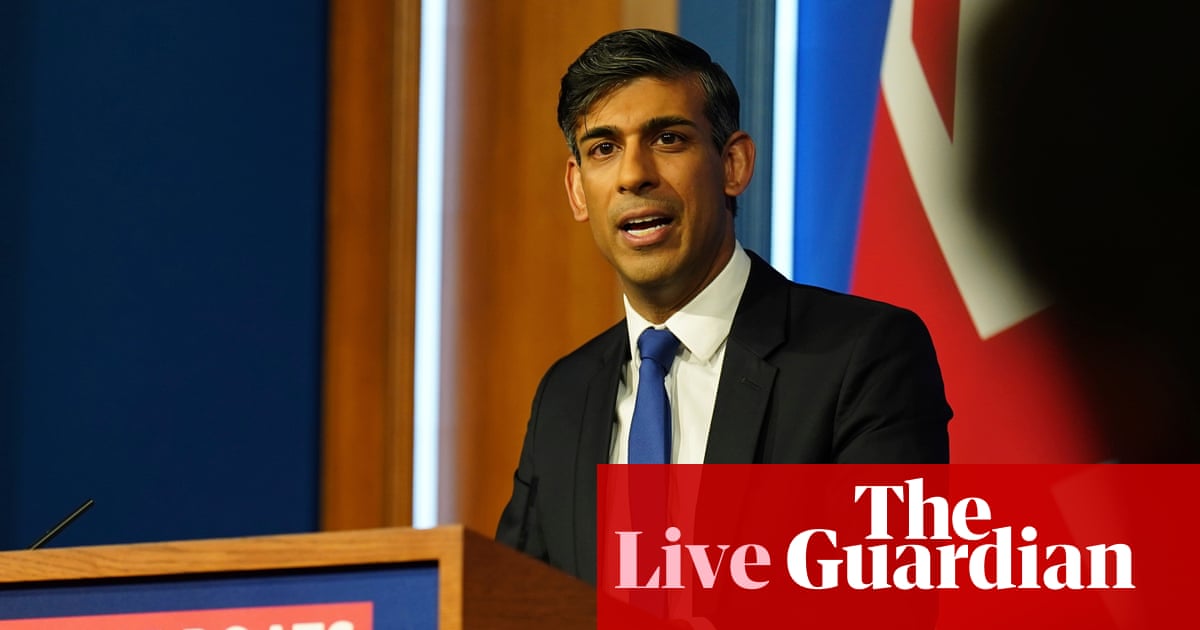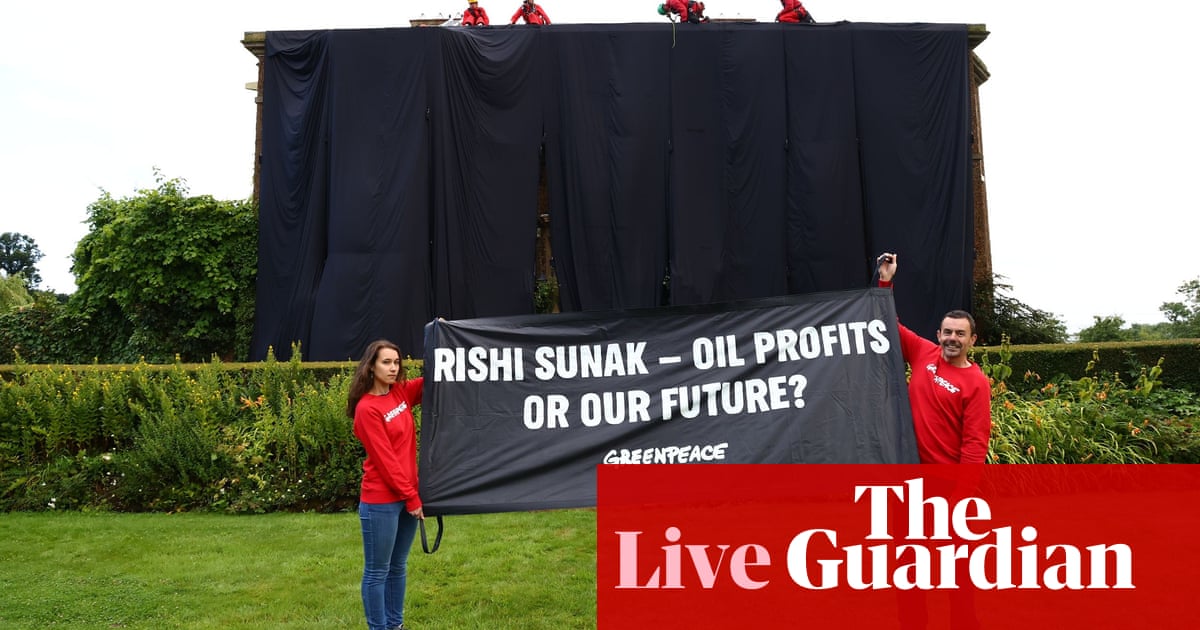
Liz Truss standing by chancellor - No 10
My colleague, political editor Pippa Crerar, has a brief update from a No 10 spokesman, who tells her Truss is standing by Kwasi Kwarteng.
A summary of today"s developments
The Labour leader, Sir Keir Starmer, has called for the recall of parliament to address the financial crisis. He urged the government to abandon the mini-budget measures which triggered the market turmoil.
Liz Truss is a “danger” to the economy and has “lost control” following the fall-out from the government’s mini-budget, according to Sir Keir Starmer.
The Labour leader stopped short of calling for the PM and her Chancellor Kwasi Kwarteng to resign, saying it was a “secondary” issue. He told Sky News the decisions being taken in Downing Street meant there was “a danger” and the pair “took a huge risk” with their plans, adding: “They’re gambling our money... to give tax breaks to the very rich.”
The Guardian has learned that departments will be asked to look for “efficiency savings” and told they must live within the budget constraints of the current spending review.
The chief secretary to the Treasury Chris Philp will write to departments within the next 48 hours setting out the request, a Whitehall source said.
Treasury minister Andrew Griffith has defended the government’s plans, which have largely been blamed for the seismic financial shock to markets.
Griffith, the financial secretary to the Treasury, told Sky News: “We think they are the right plans because those plans make our economy competitive.”
No 10 said Liz Truss is standing by Kwasi Kwarteng despite pressure on him to quit. A spokesman said: “The PM and the Chancellor are working on the supply side reforms needed to grow the economy which will be announced in the coming weeks”.
The Treasury has published a read-out of a meeting between the chancellor, Kwasi Kwarteng, and a host of representatives from somw of the biggest banks in the world. According to the statement, Kwarteng “underlined the government’s clear commitment to fiscal discipline” at a meeting aimed at reassuring the City amid market turmoil following Friday’s so-called mini-budget.
At the Labour conference Angela Rayner, the deputy leader, said although she is proud of Labour’s traditions, “there is one part of our history that I will never celebrate - losing elections”. And she says that, although Labour likes to talk about what more it should do, it should celebrate its successes more.
In her speech to the conference, Rosena Allin-Khan, the shadow minister for mental health, said that the next Labour government would guarantee access to mental health treatment within a month.
Liz Truss to appear on BBC radio tomorrow morning
Labour membership increased by more than 2,500 over the party’s conference, fuelled by the Conservatives’ turmoil and polls suggesting it is on course for victory.
The conference in Liverpool was the most financially successful in the party’s history, according to insiders. A new poll by Deltapoll as the conference closed on Wednesday gave Labour a 13-point lead, as Liz Truss faced calls to sack her chancellor, Kwasi Kwarteng, following the emergency intervention by the Bank of England after his mini-budget.
Angela Rayner closed the conference by predicting activists would be meeting soon under a Labour government. “Think how it will feel meeting here in this hall in a few years’ time after a term of a Labour government,” she said. “Back in power.”
Martin Weale, a former member of the Bank of England’s Monetary Policy Committee has warned the next 12 months are looking “pretty grim”, as he accused the chancellor of tipping “petrol on the fire”.
Asked if there has been a degree of incompetence by the government, he told the Sky News Daily podcast: “It’s rather hard to come to any other conclusion.”
Weale added: “The chancellor has in the Treasury a very well established mechanism for obtaining advice and my guess is he was offered advice and decided to ignore it.”
Liz Truss is facing growing pressure from jittery Conservative MPs to sack Kwasi Kwarteng or face a mutiny after the Bank of England’s emergency intervention to address the turmoil in the financial markets, writes Pippa Crerar and Jessica Elgot.
The move prompted comparisons to 1992’s Black Wednesday, when the UK was ignominiously ejected from the European exchange rate mechanism.
Tory MPs expressed disbelief at how sterling had slumped after the government’s mini-budget sparked market turbulence, compounded by the chancellor’s subsequent remarks, at a time when households across the country were already struggling with the cost of living.
They claimed that Kwarteng would have to resign for the party to survive the financial crisis as they urged the prime minister to reverse her plan to scrap the top 45p tax rate, which they said had been received badly in their constituencies.
Crossbench peer and former Treasury minister Lord O’Neill of Gatley said investors and companies “all over the world” were “wondering what on earth is going on in the UK”.
He told BBC Radio 4’s PM programme: “This is a breathing room for the government, in my view, to seriously think what on earth is it really trying to do and ... this idea that you can just magically quadruple productivity by a tiny corporate tax policy reversal is at the core of why investors and companies all over the world, never mind here at home, are wondering what on earth is going on in the UK.”
The EU “must not and will not back down” in the EU-UK dispute over the Northern Ireland Protocol, Michel Barnier said.
The former chief Brexit negotiator for the bloc said that Brexit had not yielded any benefits for the UK and described it as “a unilateral decision by one party with negative impacts for itself”.
During an address in Iveagh House in Dublin city, Barnier said Brexit also remained “a challenge” for Ireland, and “a blow” to the European Union project.
“Brexit is in great part the result of populism. We must be aware that this poison might still arm Europe again. But populism must not be mistaken with public opinion or public sentiment.”
The pound has managed to recover ground and London’s top index was in the green following the Bank of England surprise intervention to calm gilts markets.
The Bank said it would launch an emergency programme to buy government bonds - known as gilts - “on whatever scale is necessary” to try to bring down soaring UK public borrowing costs.
It sent sterling into the lurch, which dipped to around 1.05 against the US dollar immediately after the announcement.
However, the pound had edged back up to around 1.08 by the time European markets closed.
The intervention also seemingly calmed the FTSE 100 index which had slumped in early morning trading and again immediately after the Bank of England’s announcement.
Sir Keir Starmer: prime minister is a "danger" to the economy
Liz Truss is a “danger” to the economy and has “lost control” following the fall-out from the government’s mini-budget, according to Sir Keir Starmer.
The Labour leader stopped short of calling for the PM and her Chancellor Kwasi Kwarteng to resign, saying it was a “secondary” issue.
He told Sky News the decisions being taken in Downing Street meant there was “a danger” and the pair “took a huge risk” with their plans, adding: “They’re gambling our money... to give tax breaks to the very rich.”
Government departments to be asked to find "efficiency savings"
The Guardian has learned that departments will be asked to look for “efficiency savings” and told they must live within the budget constraints of the current spending review.
The chief secretary to the Treasury Chris Philp will write to departments within the next 48 hours setting out the request, a Whitehall source said.
Though departmental budgets are not subject to the same inflation calculations as household budgets, budgets are still likely to be squeezed because of higher than anticipated inflation since the October 2021 review.
Liz Truss ruled out more cuts during the Tory leadership contest. “I’m certainly not talking about public spending cuts, what I’m talking about is raising growth,” she said.
Ken Clarke, a former chancellor, said he hoped the government’s fiscal plan had been torn up as he called the chancellor’s mini-budget a “serious mistake”.
“I’ve never known a budget caused a financial crisis immediately like this,” Lord Clarke told Sky News.
“So when I listened to the budget, I was rather astounded by its contents, and I hope we very rapidly get out of it.
“I was hoping that we’d gone through a circus of the leadership election and we were now going to get down to dealing with a serious national crisis.
“But they have made a catastrophic start, the budget was a serious mistake, and it has caused a serious problem.”
I’m now handing the blog to my colleague Nadeem Badshah.
Whitehall to be told to find "efficiency savings" – reports
Sky News’s deputy political editor, Sam Coates, understands that Chris Philp, the chief secretary to the Treasury, is to write to all secretaries of state calling for “efficiency savings” to be found.
The former cabinet minister Julian Smith has called for the government to make changes to its growth plans, which, as Jessica Elgot, our deputy political editor, points out, is the first such intervention from a former cabinet minister.
In his media rounds, the financial secretary to the Treasury, Andrew Griffith, tried to argue that “all major economies” were experiencing the same volatility as the UK.
“What is unprecedented is the level of volatility we have seen in all developed markets. The UK went into this with a strong balance sheet. The UK has the second lowest debt to GDP ratio in the G7,” he told Sky News.
We are seeing the same impacts of Putin’s war in Ukraine cascading through things like the cost of energy, some of the supply side implications of that.
That’s impacting every major economy. Every major economy you are seeing interest rates going up as well. Every major economy is dealing with exactly these same issues.
The Bank of England has made this timely intervention. What the chancellor and I are focused on is delivering that economic growth plan.
Package of tax cuts and borrowing "right plans" – Treasury minister
Liz Truss and Kwasi Kwarteng have not appeared in public today to address the unfolding financial crisis, but the Treasury minister Andrew Griffith has done a round of broadcast interviews. In them he defended the government’s plans, which have largely been blamed for the seismic financial shock to markets.
Griffith, the financial secretary to the Treasury, told Sky News: “We think they are the right plans because those plans make our economy competitive.”
Get on and deliver that plan. That’s what I, the chancellor and my colleagues in government are focused on is getting on and delivering that growth.
That is what is going to allow consumers to benefit. In the meantime, we are protecting every household and every business from the biggest macro shock out there at the moment, which is the cost of energy.
Tomorrow’s edition of The Spectator has a remarkable front page for a conservative magazine.












